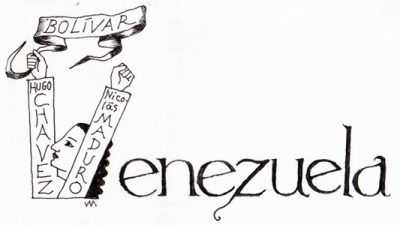A Note on the Crime Against Venezuela

To clarify the importance of the January 23rd coup attempt in Venezuela we remember that ever since WWII the customary motivation for violations of the Convention on Genocide has been to gain a region’s natural resources. For example Iraq, Libya, Syria, Haiti, Central African Republic, Democratic Republic of Congo, South Sudan, Guatemala, and others.
The people of resource-rich areas are forced into flight, exile, refuge elsewhere, or are attacked by disease, or starvation, or directly murdered by military programs, or divided internally into civil wars assuring the death of multitudes.
Damages are inter-generational with the effects of depleted uranium weaponry or mining waste; the survivors of one generation lose their children in the next. The effect of destroying a habitat is the destruction of a people with legal historical claim to the land and its natural resources.
If these people are eradicated, resource development proceeds without impediment or any benefit or payment to the rightful owners. Night’s Lantern places an implicit warning for peoples inhabiting or able to make legal claim to resource-rich territory. Venezuela possesses about a quarter of the earth’s oil resources. The corporate battle for profits is understood to be criminal. The U.S. has made a point of withdrawing from the International Criminal Court and attempting to destroy international law. Since there is strong evidence that Venezuela is threatened with a takeover by corporate interests, represented by U.S. policy, the people of Venezuela are now under a genocide warning.

A summary of the current coup attempt: on January 23rd, Juan Guaidó, leader of the right wing National Assembly declared himself the President of Venezuela. During the presidency of Hugo Chavez, and despite the failure of the first U.S. attempted coup against him, and then after the curious death of Chavez, and after the presidency was assumed by Chavez’s and the people’s chosen successor, Nicolás Maduro, the U.S. has continually and heavily funded the country’s political opposition. Guaidó’s counter-democratic declaration was endorsed immediately by Brazil, the U.S. and Canada in an attempt to overthrow a democratically elected government. Juan Guaidó’s platform if allowed to rule, would include returning nationalized companies to their previous owners.
The U.S. Vice president’s call-out to the Venezuelan people to rise up and embrace Guaidó as their President, failed. Of the Americas, governments installed by the U.S. have supported the U.S. position. Countries of the Americas controlled by right wing middle classes at the service of corporate policies and wealth, also support the U.S. position.
Western media explain ‘a need for change’ rising from the country’s ‘humanitarian crisis,’ which on examination is an economic crisis rising from very low prices of oil – and then the debilitating U.S.-initiated sanctions to sideline Venezuela’s attempts at economic recovery. As the largest holder of oil resources in the world Venezuela’s political and economic difficulties are consistently traced to foreign corporate interests.
The European Union has demanded new elections in an attempt to discredit President Maduro’s victory at the polls last May and his re-installation as President on January 10th. Cuba has shifted 2500 of its health providers from its mission to the poor in what has become fascist Brazil, to Venezuela. Venezuela’s alliances with Russia, China, Turkey, Iran, Mexico, among others, remain. Within Venezuela, the government and its supporters including all branches of the military have remained loyal to the country’s Constitution and Nicolás Maduro as the elected President. The U.S.-Brazil-Canada axis attempt to effect its choice of rulers for another country has risked tripping these as aggressors and Venezuela, into war. As noted at the mourning for Hugo Chavez whose illness many believe was the result of an assassination, “Chávez vive, la lucha sigue!”.
*
Note to readers: please click the share buttons above. Forward this article to your email lists. Crosspost on your blog site, internet forums. etc.
This article was originally published on the author’s blog site: Night’s Lantern.
Images are by Julie Maas

